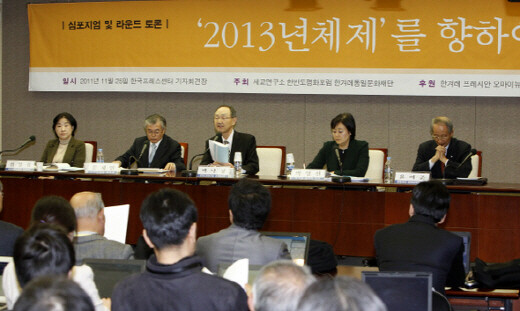hankyoreh
Links to other country sites 다른 나라 사이트 링크
Scholars discuss bipartisan solutions for Korean Peninsula in 2013

By Park Byong-su
The “Toward the 2013 Framework” symposium took place at Seoul Press Center on Friday under the joint organization of the Hankyoreh Foundation for Reunification and Culture, the Segyo Institute, and the Korea Peace Forum.
In a presentation on “The 2013 Framework and Strategy for Peace and National Security,” former Unification Minister Lee Jong-seok said, “Now is a time when we need a vision from the perspective that peace is the economy and welfare.”
“We need to open up the inter-Korean relations debate to more citizens and regions, using this to solve the North Korean nuclear issue, improve inter-Korean relations, and build a system of peace on the Korean Peninsula,” Lee said.
Seoul National University Professor Lee Keun said, “For North Korea policy to work properly, we need to create ideas that even anti-Communist conservatives can agree to.”
People's Solidarity for Participatory Democracy Secretary General Lee Tae-ho said, “We need to take more interest in more pioneering arms controls in consideration of the potential threat to North Korea from the nuclear umbrella and South Korea’s conventional weaponry, with a military budget that is greater than North Korea's gross domestic product.”
Hanshin University Professor Lee Il-young proposed a diverse network economy among local communities, civil society, and business as a key strategy for a 2013 framework.
During a debate, Hallym University Professor Seong Kyoung-ryung said, “I acknowledge that we need a network among local communities, civil society, and business in the long run, but in the short term a change in national administrations is the most important thing.”
Kyungwon University Professor Hong Jong-hak said, “We must not repeat the experience of 1997, when we were forced to accept more neoliberalism because of the foreign exchange crisis.”
“The 2013 framework needs to build an innovation economy and use it as a driving force for new development,” Hong said.
Please direct questions or comments to [englishhani@hani.co.kr]
Editorial・opinion
![[Guest essay] The real reason Korea’s new right wants to dub Rhee a founding father [Guest essay] The real reason Korea’s new right wants to dub Rhee a founding father](https://flexible.img.hani.co.kr/flexible/normal/500/300/imgdb/original/2024/0423/8317138574257878.jpg) [Guest essay] The real reason Korea’s new right wants to dub Rhee a founding father
[Guest essay] The real reason Korea’s new right wants to dub Rhee a founding father![[Column] ‘Choson’: Is it time we start referring to N. Korea in its own terms? [Column] ‘Choson’: Is it time we start referring to N. Korea in its own terms?](https://flexible.img.hani.co.kr/flexible/normal/500/300/imgdb/original/2024/0423/3617138579390322.jpg) [Column] ‘Choson’: Is it time we start referring to N. Korea in its own terms?
[Column] ‘Choson’: Is it time we start referring to N. Korea in its own terms?- [Editorial] Japan’s rewriting of history with Korea has gone too far
- [Column] The president’s questionable capacity for dialogue
- [Column] Are chaebol firms just pizza pies for families to divvy up as they please?
- [Column] Has Korea, too, crossed the Rubicon on China?
- [Correspondent’s column] In Japan’s alliance with US, echoes of its past alliances with UK
- [Editorial] Does Yoon think the Korean public is wrong?
- [Editorial] As it bolsters its alliance with US, Japan must be accountable for past
- [Guest essay] Amending the Constitution is Yoon’s key to leaving office in public’s good graces
Most viewed articles
- 1[Column] ‘Choson’: Is it time we start referring to N. Korea in its own terms?
- 2Why Korea shouldn’t welcome Japan’s newly beefed up defense cooperation with US
- 3Senior doctors cut hours, prepare to resign as government refuses to scrap medical reform plan
- 4[Guest essay] The real reason Korea’s new right wants to dub Rhee a founding father
- 5Opposition calls Yoon’s chief of staff appointment a ‘slap in the face’
- 6[Column] The clock is ticking for Korea’s first lady
- 7Terry Anderson, AP reporter who informed world of massacre in Gwangju, dies at 76
- 8New AI-based translation tools make their way into everyday life in Korea
- 9Samsung barricades office as unionized workers strike for better conditions
- 10Korea ranks among 10 countries going backward on coal power, report shows